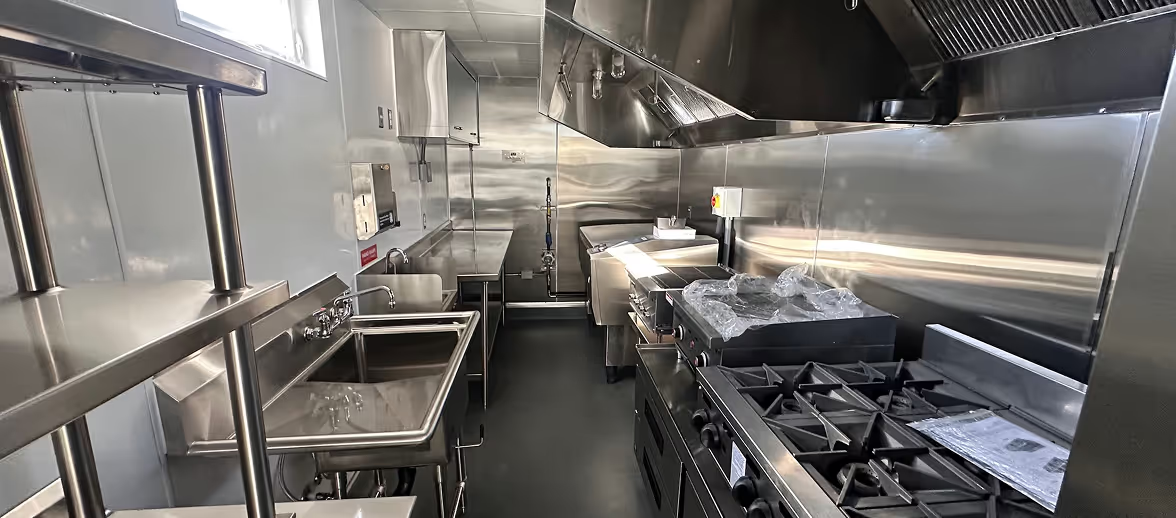%2520(1).avif)
Introduction
Did you know Oregon overhauled its mobile food unit regulations in 2020, setting tougher standards for kitchen trailer design, safety, and inspections? If you plan to operate a mobile kitchen in Oregon, passing these inspections isn’t optional, it’s the only way to open legally and avoid costly delays.
To get licensed, every kitchen trailer must clear two critical steps: a DMV safety inspection and a food safety inspection by the Oregon Health Authority (OHA). Many operators underestimate this process, but failing an inspection can result in penalties, lost time, or even a shutdown.
Oregon also happens to be home to one of the most vibrant mobile food scenes in the U.S. In Portland alone, more than 500 food carts and trailers thrive in designated “pods.” From coastal seafood kitchens to Willamette Valley winery catering trailers, the opportunities are endless but only if your trailer meets Oregon’s strict inspection requirements.
This article breaks down a complete kitchen trailer inspection checklist for Oregon, including DMV standards, OHA food safety rules, fire code compliance, and practical tips to help you stay compliant from day one.
Understanding Kitchen Trailer Regulations in Oregon
Why Oregon Enforces Food Safety Rules
Oregon has one of the most vibrant street food cultures in the U.S., especially in Portland, where hundreds of food trailers operate daily. With this popularity comes high responsibility: the state enforces strict rules to minimize risks of foodborne illness, fire hazards, and sanitation problems in confined mobile kitchens.
By complying with these standards, kitchen trailer operators not only avoid penalties and shutdowns but also gain credibility in a competitive food scene.
Agencies Involved in Kitchen Trailer Permits & Licenses
- Oregon Health Authority (OHA)
Oversees statewide food safety rules under the Oregon Food Sanitation Rules. The OHA’s Food Safety Division collaborates with counties to review plans, issue licenses, and conduct inspections.
- County Health Departments
Issue mobile food unit licenses within their jurisdictions. Requirements can vary: for example, Multnomah, Lane, Marion, and Deschutes counties may apply additional inspection criteria.
- Oregon DMV
Regulates mechanical safety, licensing, and registration of kitchen trailers. Passing a DMV inspection is mandatory before operation.
- Local Fire Marshals
Enforce fire safety codes, propane storage rules, and suppression system compliance. Fire marshal approval is often required before final licensing.
%2520(1).avif)
Kitchen Trailer Inspection Requirements Checklist (Oregon)
Passing inspections in Oregon requires kitchen trailers to meet structural, sanitation, equipment, utility, fire, and DMV safety standards. Below is a practical checklist operators can use to prepare for both OHA health inspections and DMV safety reviews.
1. Structural & Sanitation Standards
- Floors, walls, ceilings: Smooth, durable, and non-absorbent surfaces required (OAR 333-150, Food Sanitation Rules).
- Handwashing sink: Required, separate from the three-compartment sink; must provide soap, towels, and signage (OAR 333-162).
- Water supply: Potable water with hot (≥100 °F) and cold running taps.
- Wastewater tank: At least 15% larger than freshwater capacity (OHA guideline).
- Lighting & ventilation: Adequate brightness with protected fixtures; vents must prevent grease buildup.
2. Food Trailer Equipment Compliance
- NSF-certified appliances: All cooking and refrigeration equipment must meet NSF standards.
- Temperature controls:
- Cold storage ≤ 41 °F
- Hot holding ≥ 135 °F (FDA Food Code standard, adopted by Oregon).
- Ventilation hoods & fire suppression: UL-300 compliant hood system required over fryers/grills producing grease.
- Food prep surfaces: Non-toxic, smooth, and easily cleanable.
3. Utility Systems & Safety
- Plumbing: Proper backflow prevention, indirect drains/air gaps, and grease trap where required.
- Electrical: NEC-compliant wiring; no exposed conductors or makeshift connections.
- Propane/gas lines: Cylinders secured; lines must be leak-free with accessible shutoff valves.
- Waste disposal: Proof of commissary or service agreement for disposal of graywater and FOG (fats, oils, grease).
4. Fire & Safety Codes
- Class K extinguisher: Mandatory for fryers or grease-producing appliances (Oregon Fire Code, OSFM guidance).
- Hood suppression system: Must be serviced and documented on schedule.
- Emergency exits: Clearly marked and unobstructed.
- Propane storage: Cylinders mounted securely; local fire marshal enforces capacity limits.
- CO detectors: Recommended in enclosed propane/generator units.
5. Mechanical & DMV Safety Inspection (Trailer Chassis & Roadworthiness)
Before foodservice review, trailers must pass an annual Oregon DMV vehicle inspection (Oregon DMV).
- Chassis, frame & hitch: Free of rust, cracks, or weld failures.
- Brakes, axles & suspension: Fully functional.
- Wheels & tires: Legal tread depth, correct inflation, intact bearings.
- Lights & reflectors: Brake lights, signals, and reflectors operational.
- Couplers & safety chains: Dual chains and breakaway system (if required).
Tip: Oregon inspectors may request to review operational logs (temperature records, cleaning schedules, fire suppression service logs). Having these organized improves your chance of passing on the first inspection.
%2520(1).avif)
Documentation, Permits & Insurance Requirements for Kitchen Trailers in Oregon
1. Food Trailer Permit & Health Inspection
Every mobile kitchen trailer must hold a valid mobile food unit license issued by the county health department. Licensing is based on the Oregon Food Sanitation Rules (OAR 333-150), which adopt the FDA Food Code.
- Applications typically require floor plans, menu, and commissary agreement.
- Trailers must pass an OHA food safety inspection, covering sanitation, water supply, equipment, and structural standards.
- Local environmental health inspectors conduct both plan review and on-site inspection before a license is issued.
2. Insurance & Liability Coverage
Operators must carry:
- General liability insurance – protects against foodborne illness and injury claims.
- Commercial auto/trailer policy – required for DMV registration and legal road use.
- Property/equipment coverage – insures cooking appliances, generators, and interior fit-out.
3. Fire Department Inspection
Any trailer with cooking appliances must pass a fire safety review by the local fire marshal. Requirements include:
- UL-300 fire suppression system over fryers and grills.
- Commercial hood with grease filters, serviced regularly.
- Tagged Class K extinguisher.
- Propane shutoff valves and cylinder storage compliant with the Oregon Fire Code.
4. DMV Registration & Road Compliance
Trailers must be registered with the Oregon DMV as commercial vehicles (Oregon DMV). Requirements include:
- VIN/title verification.
- Functional brakes, axles, and lighting.
- Proper safety chains and hitch.
- Compliance with trailer weight class and inspection standards.
5. Zoning & Location Permits
Local zoning laws control where trailers may operate:
- In Portland, trailers often operate in designated “pods” with site utility requirements.
- Counties may set additional rules for trash storage, wastewater disposal, and generator use.
- Operators must confirm location compliance before siting their trailer.
6. Temporary & Event Permits
Special permits are required for short-term operations at farmers markets, fairs, or festivals. Counties typically issue a temporary restaurant license, which bundles food safety, fire, and location requirements into a single approval.
7. Waste Management & Environmental Compliance
Operators must demonstrate safe disposal of wastewater and grease:
- Licensed waste haulers required for graywater and FOG (fats, oils, grease).
- Most counties require a commissary agreement showing where fresh water is obtained and waste is disposed.
%2520(1).avif)
Streamline Inspections with Mobile Culinaire
Permitting delays, contractor headaches, and failed inspections are common when renting generic mobile kitchens. Mobile Culinaire eliminates those barriers by delivering inspection-ready trailers built to code from day one.
Purpose-Built, Not Retrofits
Each Mobile Culinaire unit is engineered in-house, drawing on experience from 400+ kitchen deployments nationwide. With optimized layouts and durable construction, our kitchens are designed to pass inspections. They are not patched together after the fact.
Turnkey & Fully Equipped
Units arrive with commercial-grade appliances, NSF finishes, ventilation hoods, plumbing, HVAC, and fire suppression systems already installed. That means you can start cooking in hours, not weeks — no contractors, no missing parts, no delays.
Compliant by Design
Every trailer is built to meet or exceed NFPA 96 ventilation, UL 300 fire suppression, and FDA/Oregon Food Code standards. This speeds up both OHA health inspections and fire marshal reviews, saving you time and avoiding costly retrofits.
Regulatory Guidance & Support
Our team understands the Oregon inspection landscape from commissary agreements to local fire code enforcement. We will walk you through the paperwork and approvals so you deal with less red tape and fewer rejections.
Flexible Rentals & End-to-End Service
From weekend festivals to year-long renovations, Mobile Culinaire offers flexible rental terms. We also manage delivery, setup, and breakdown, giving you one point of contact and zero vendor-coordination hassles.
%2520(1).avif)
Conclusion
Operating a kitchen trailer in Oregon means navigating a maze of inspections, permits, and compliance standards. From DMV safety checks to OHA food safety rules and fire marshal approvals, success depends on preparation and the right equipment.
By following Oregon’s inspection checklist and securing the proper documentation, operators can avoid costly delays, protect public health, and build consumer trust in one of the nation’s most vibrant street food markets.
For those who want to streamline the process, Mobile Culinaire offers inspection-ready kitchens designed to meet or exceed Oregon’s codes from day one. With compliant builds, turnkey equipment, and regulatory support, passing inspections becomes faster, smoother, and less stressful.
Ready to simplify your permitting and inspections? Contact Mobile Culinaire today to get your inspection-ready kitchen delivered.
People Also Ask (FAQ)
What are the food trailer inspection requirements in Oregon?
In Oregon, kitchen trailers must pass both a DMV mechanical safety inspection and a food safety inspection by the Oregon Health Authority (OHA) before operating legally. Inspectors review trailer roadworthiness (tires, brakes, chassis, lights) as well as health and sanitation standards, including water supply, wastewater capacity, equipment safety, and food handling practices. Local fire marshals also inspect propane systems, hoods, and suppression systems. Passing all three (DMV, OHA, and fire) is mandatory for legal operation.
What equipment must a kitchen trailer have to pass inspection in Oregon?
To meet inspection standards, Oregon kitchen trailers must have NSF-certified cooking and refrigeration equipment, including refrigerators, freezers, fryers, and prep stations. A three-compartment sink and a separate handwashing sink with hot and cold running water are required. Ventilation hoods with UL-300 fire suppression must be installed over grease-producing appliances. Trailers also need a potable water system, wastewater tank (at least 15% larger than the freshwater tank), proper lighting, and pest prevention measures. All surfaces must be smooth, durable, and easy to sanitize.
Do food trailers need a permit and license to operate in Oregon?
Yes. In Oregon, kitchen trailers must obtain a mobile food unit license from the county health department, based on OHA’s Food Sanitation Rules. Operators also need DMV registration and road compliance for the trailer chassis, and fire marshal approval if cooking appliances are installed. A commissary agreement is often required to show access to fresh water and proper disposal of wastewater and grease. Without these licenses and approvals, a trailer cannot legally operate.
Testimonial

"What is standing out when you look at the mobile kitchen operation is the efficiency that we can really achieve because it's built for that."
Tell us about your kitchen needs and request a quote.
.png)
Turnkey mobile kitchen
.png)
Proudly made in-house in the USA
.png)
Commercial grade kitchen equipment
.png)
Code-compliant
Trusted by Industry Leaders




.gif)

%20(1).avif)
%20(1).avif)
%20(1).avif)